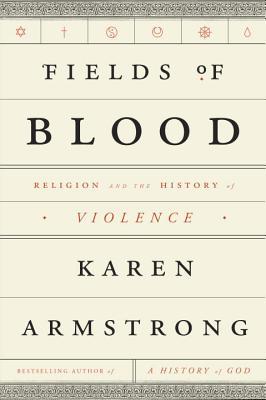 Karen Armstrong does a good job of summarizing the history of the development of religion & state succinctly in each chapter, linking each of the histories to each other in terms of patterns in government. What really struck me throughout was how effectively autocratic governments have fared throughout the ages – well, they would, not having to go through all the other layers of government in order to get things done, but still! In addition to this, the seeming inability to remove religion from society completely was quite interesting to see: the nation took the place of traditional belief systems, and instead of fighting for those beliefs, people would fight for the sake of their nation. It almost seems like the issue isn’t so much religion in its inspiration of violent devotion so much as humans at large, to be honest.
Karen Armstrong does a good job of summarizing the history of the development of religion & state succinctly in each chapter, linking each of the histories to each other in terms of patterns in government. What really struck me throughout was how effectively autocratic governments have fared throughout the ages – well, they would, not having to go through all the other layers of government in order to get things done, but still! In addition to this, the seeming inability to remove religion from society completely was quite interesting to see: the nation took the place of traditional belief systems, and instead of fighting for those beliefs, people would fight for the sake of their nation. It almost seems like the issue isn’t so much religion in its inspiration of violent devotion so much as humans at large, to be honest.
Which brings up the age-old issue of, do the ends justify the means? Pacifist idealists never really gained much ground in government from what I’m gleaning from this book (e.g. Confucians would be dismissed as being of no use to the government even as they were allowed to give the emperor advice – at their own risk of course – up till the revolution), for obvious reasons, and considering how brutal leaders actually got things done – whether the things that got done were the things that should have been done or should be condoned is another can of worms altogether* – would it be preferable for an idealist to concede that perhaps it would work out better in the end to rule with an iron fist and slowly change the people such that the utopic vision becomes reality? Of course, this is an ideal situation even as such: it would probably take generations, and everyone involved in the scheme would have to be dedicated throughout the generations. (Armstrong actually addresses this in part when she talks about revolution.) You would probably also want to rewrite all of history so no one can question your ascendancy and your entire plan. And then in the end, I’m not really sure you’d end up with a utopia even if everything goes according to plan; would that be a utopia or a dystopia? Add to that the issue of keeping dissenters quiet (assuming you can’t please everyone; if you can please everyone, this wouldn’t be an issue) along with what to do with whomever you deposed (assuming some sort of deposition occurred and whoever lost their position of power harbours resentment to some extent)… and the list goes on**.
But I digress. Or do I? I feel as though Fields of Blood is actually primarily about topics such as this, or that these are things the reader cannot but think about while reading it. That being said, Armstrong does take you through a quick history of various religions around the world – I say quick, I mean about 30 pages or so; enough to get you grounded, but not as much as could be said, considering each topic could probably fill up an entire book (or more), which she does in her other publications – emphasizing all throughout that for a good chunk of that time, religion was (and to a certain extent, is) inseparable from politics. Anyway, if you’re at all interested in reading up on the history of religion the myth of violence in association with religion, this is your book.
Large print & audiobook versions are also available.
Here are a couple more titles you might be interested in:
God Against the Gods: The History of the War Between Monotheism and Polytheism by Jonathan Kirsch
Zealot: The Life and Times of Jesus of Nazareth by Reza Aslan
The Evolution of God by Robert Wright
*As is the question of “condoned by whom” and what constitutes what should be done. That’s another topic for a whole ‘nother post.
**But then if you’re deposing someone without having an ideal to strive towards, wouldn’t it end up as mere rebellion rather than revolution? So I suppose an ideal is probably for the best to have in mind, but not so much for acting in (complete/maybe even partial) accordance to. See Camus on the subject of rebellion.